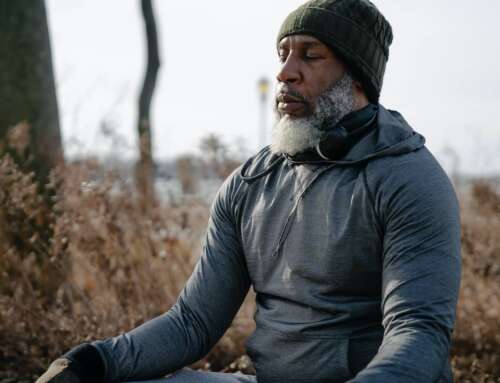If there’s anything we can all agree on right now, it’s this: things have certainly gotten very strange, very quickly.
How have you been feeling? We’re experiencing a global health crisis that’s unlike anything we’ve seen in recent history. No matter where you are in the world, chances are you’ve been affected somehow by COVID-19 and all of the ways it has already impacted our world.
If you’re like many of us, you’ve probably felt anxiety, fear, frustration, and confusion. Maybe you’ve felt helpless or hopeless, and highly uncertain about the state of things. Everyone is dealing with a lot right now—our collective and individual situations are decidedly not normal—and it doesn’t take long for a person to feel worn down.
It’s more important than ever to be resilient.

Photo by Elijah O’Donnell on Unsplash
Resilience is defined as the “ability to recover readily from illness, depression, adversity, or the like; buoyancy.” It’s a skill you’ve probably been honing for a long time, whether or not you’re aware. Every time you come out on the other side of a difficult, challenging, or traumatic event, you do so with a little more resilience.
But how, exactly, do you manage to come out on the other side? Resilience involves more than simply “toughing it out.” It also involves learning how to accept a situation, no matter how unsavory it may seem, and committing in the moment (or even ahead of time) to respond in a way that benefits you.
Rather than thinking of resilience as a quality that you either have or don’t have, try thinking of it as a skill to constantly practice. It’s one of the most rewarding skills to practice, too, because as long as you’re practicing resilience, you’re better off than you would be otherwise.
How can love and sex help you practice resilience in times of crisis?

Photo by Anthony Metcalfe on Unsplash
As a sex coach, people may be looking to you for guidance and comfort during this strange and stressful time. Here are some resilience tips you can recommend to your clients and keep for yourself, as well.
- Get into the habit of acceptance. Even though it may seem counter-intuitive to accept a situation you don’t feel “okay” with, it’s actually a critical step in the process of coping. It’s important to accept circumstances—even if you plan to work on changing them in some way. This is equally true for circumstances outside of your control (for example, the various restrictions that have been put in place for our protection) and for circumstances that originate from you (feelings of frustration, fear, confusion, etc).
When you’re suddenly hit with anxiety in the middle of your work day, what is a resilient response?
Maybe you think it’s more resilient to simply try ignoring the feeling and “power through,” but consider what’s more beneficial to you. Stop, even if it’s just for a few seconds, and be honest with yourself about what you’re feeling. Give yourself permission to feel anything, and offer that emotion some love—even if it’s not necessarily comfortable. “Negative” emotions are still ours, still a part of us in that moment, and every part of us deserves our love and compassion. Tell yourself, “I’m feeling anxiety right now and that’s okay. It’s a temporary state and it makes sense for my current situation. I feel this anxiety and I still love myself.” - Double down on your self-care! When so much feels abnormal and uncertain, it’s logical that you might have gotten off-track in your normal routine. Chaos feels extremely disruptive, and the chaos of a global health crisis is particularly pervasive and hard to get a break from.
Even though it’s easy to get off-track, it’s more important than ever to stick with your most helpful routines. This is a fantastic time to really lean into comforting rituals (or create new ones) and seek out bits of pleasure. Embrace the joys of journaling, drawing or coloring, exercising, warm baths, long walks, and anything that helps soothe your soul. Self-care during a crisis isn’t selfish: it’s an important gift to yourself and to those who enjoy your support. - Practice mindfulness. Mindfulness is a wonderful anchor when you’re lost in a sea of worried thoughts, fear, and other murky emotions.
While it’s easy to spend a lot of time in your mental and emotional spaces, it’s vital to give time and attention to your physical space, as well. Since many of us are staying home now, put some energy into making your home a comfortable, visually appealing place that you’re happy and excited to be in.
Be mindful when it comes to the feelings in your body, as well. Stress and anxiety are mental feelings with the power to physically exhaust you, if left unchecked. Pay attention to the tension in your body. It takes a lot of energy to hold tension in a muscle, and many of us are doing this constantly without even realizing it!
Throughout your day, take a few minutes to intentionally release the tension from your hands, shoulders, neck, jaw, tongue, and everywhere else. Breathe fully and deeply, as deep breaths are one of the first things to go in a stressful episode. The more mindful you can be of your physical surroundings and physical state, the more effectively you can pinpoint energy drains that make it difficult to feel resilient. - Lean into your sexuality! It makes sense to feel unsexy when you’re fretting over a chaotic situation.
It’s okay if sex has fallen lower on your list of priorities, but don’t forget how important and powerful it is for your physical, mental, and emotional health. Give yourself something to look forward to by carving out time for sex with a partner (assuming it’s safe to do so) or with yourself.
Set an intention with your pleasure and orgasm by dedicating their energy to a good cause, like strengthening yourself so you can continue to support yourself and others however you can. Create a new sex-based ritual that feeds your spirit and gives you a much-needed way to release. Don’t panic if you don’t feel particularly turned on or are experiencing fluctuations in your desire level. Be patient with yourself and try to give yourself enough time to relax and enjoy time dedicated especially to pleasure and healing.
Staying resilient in times of crisis can feel difficult, but remember: as long as you’re making the effort to go on, you’re doing a great job. Remember, any small bit of progress is better than none at all!
On behalf of our team at Sex Coach U, please know that we’re all in this together. You’re a part of our community (and a part of our world!) and you have our love, support, and best wishes for safety and comfort. We’re more resilient together. Hang in there, and please reach out if there’s anything we can do to help you.
———————
Continue the Conversation
Curious about training to become a Certified Sex Coach™? Join the next live Info Session to meet the SCU team and participate in a live Q&A!







